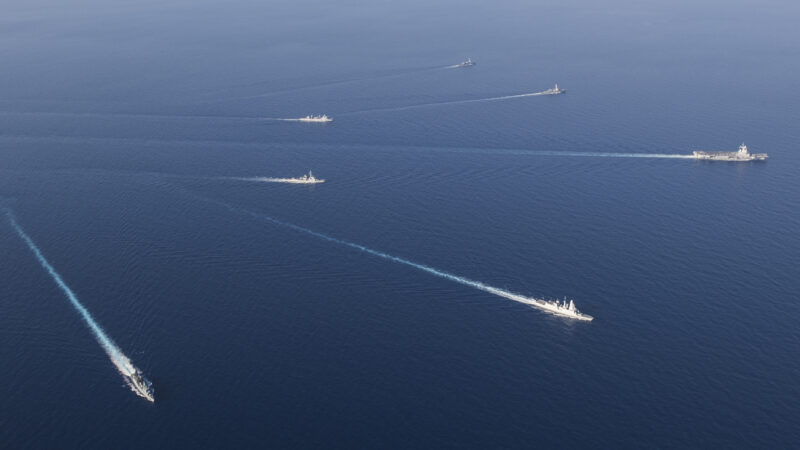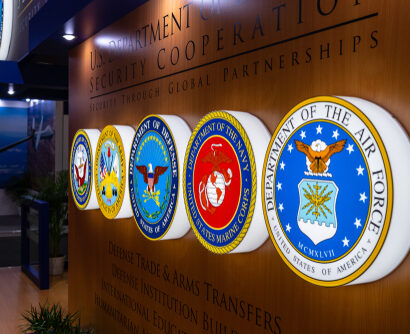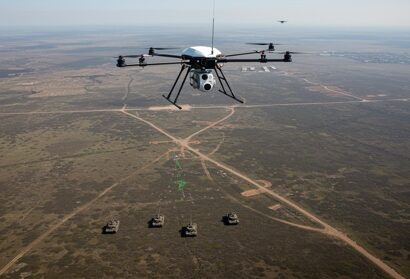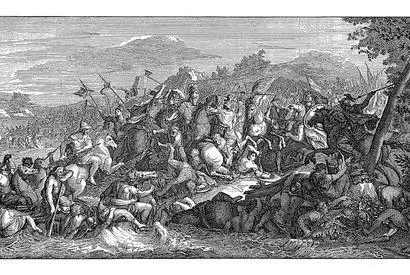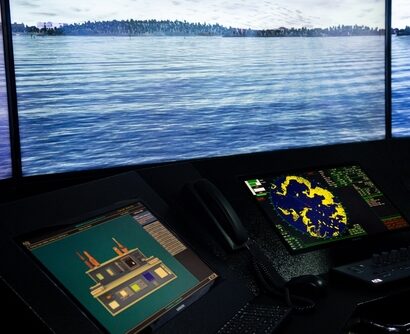Abstract: Strategic foreign policy is what the EU needs to master, rising to the challenges of the 21st century. In this, it needs to strive for agency across the board and not just primarily on the civilian side of sustainable development. Beyond building peace, it has to face adversity while cultivating strategic cooperation in a multi-polar world of increasing great-power rivalry. At the same time, failed states, famine and climate change will continue to put pressure on foreign policy-makers, while technological revolutions and globalisation potentially uproot societies, restructure business models, entire economies and patterns of trade. Similarly, so-called ‘commons’ – the ocean, ‘big data’, cyber- and outer-space – do not just pose opportunities, they are key areas of competition. All this requires a strategic approach by the EU: and judging by the competition, it is late in joining the already well-advanced race. Ultimately, from protecting human rights, via equitable access to resources and opportunities, to the viability of our planet’s eco-system: Europeans need to act jointly and strategically to avoid being mere bystanders of events that are by no means guaranteed to unfold in ways favourable to them – or indeed humanity as a whole.
The strategic mindset required for this, is developed along a review of Hans-Dieter Heumann’s recent book, ‘Strategische Diplomatie – Europas Chance in der multipolaren Welt‘ (Ferdinand Schöningh, Paderborn, 2020), so far only available in German. The experienced diplomat’s suggestions and analysis are then further augmented by a brief overview of key areas of great-power competition, with which the EU has to contend or at least accommodate itself in, in the multi-polar world of the 21st century.
Bottom-line-up-front: The EU needs to think and act strategically – with a ‘smart’ range of power across the board of foreign policy. To do this, it can learn a thing or two from history, but critically, it depends on Europeans empowering it to act on their behalf in rising to the challenges of the 21st century. And these are challenges that not only require soft- as much as hard-power tool-sets to be managed, but also fundamentally: a willingness to tackle them – and tackling them jointly on the part and on behalf of EU member-states and their citizens.
Problem statement: Despite significant progress in some respects, the EU is so far lacking the capabilities, the decision-making processes and the strategic outlook to assume this task for its citizens. So, how is it to handle the key challenges of the 21st century that are beyond the power of individual EU-member-states?
So what?: Recognising the pressing need to act, Europeans move closer together. Russia’s annexation of Crimea gave EU integration unwittingly a much-needed boost, but the power of the union to carry out its strategic mission – its agency – still lags behind what is required to meet current and future challenges. Beyond winning over member-states to provide essential hard- and soft-power capabilities, the EU crucially depends on combining a purposeful decision-making process with a mind-set of strategic foreign policy – a mind-set that in turn could receive critical inspiration by Han-Dieter Heumann’s book.
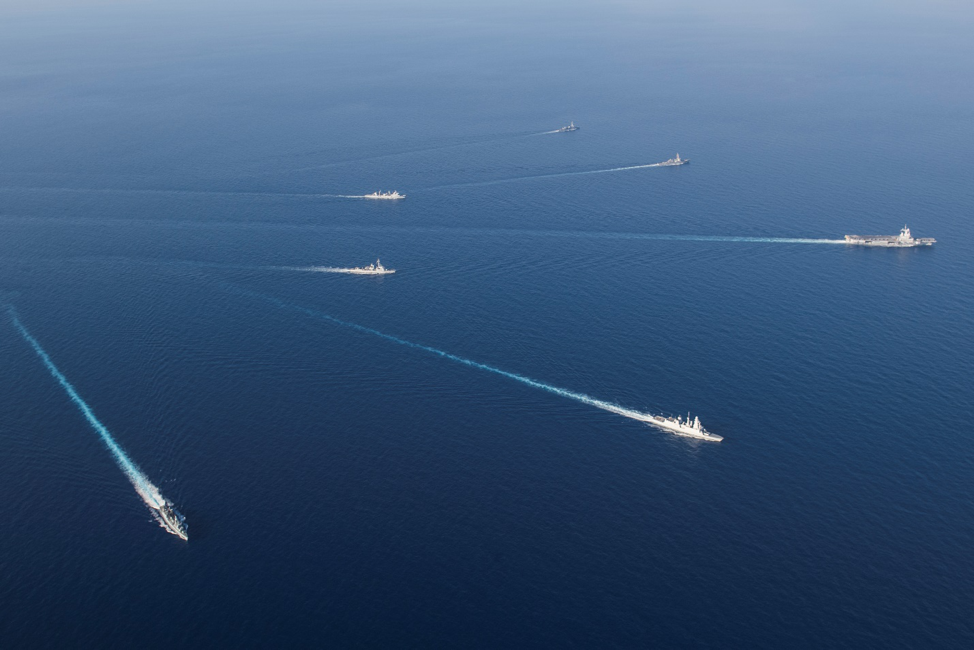
Source: Bundeswehr/Marine Nationale
European strategic foreign policy depends on coordinated and joint action of the member-states: But are the EU-member-states sharing the same vision of foreign policy and the coming challenges of the 21st century – at sea as much as in other contested areas of international competition? Or are they steaming in different directions?
“Not the end of the Soviet Union, but 2014 marked the worst year in decades of Russia’s foreign policy”, as former German career diplomat and president of the federal academy of security policy Heumann strikingly judged.[1] According to him, not the disintegration of the former Soviet Union in 1991, but Putin’s short-term gamble with Crimea destroyed Russia’s hopes for a powerful place in a multipolar 21st century. The annexation of and subsequent war in Ukraine cemented a corrupt and stagnant economic and political system at home, while it alienated Europe and kick-started its bid for strategic autonomy. At the same time, a pressing challenge for Russia, as well as the EU, is posed by the danger of painful European economic sanctions pushing Putin’s regime into the arms of China.[2]
However, as much as Putin’s move to take Crimea may have been a mere ‘gamble’ that ultimately served to shore up his own domestic power-base,[3] it appears to have turned out well, at least for him – so far. By following it up with a further military intervention in Syria, the Russian president at least appears to have succeeded in not only consolidating his gains in Ukraine, but also in making himself indispensable for any diplomatic solution to the crisis in the Middle East,[4] while at the same time putting pressure on a European Union already domestically strained under the political controversy driven by the continuing influx of refugees. Refugees, who, at least in 2015 and 2016,[5] mainly stemmed from the Syrian civil war that Putin so violently managed to further move out of reach of a European resolution to the conflict.
Nevertheless, Heumann has a point: holistically seen, including economic and social factors, neither the ongoing interventions in Ukraine nor in Syria serve the interests of the Russian people or advance their position in the challenges of the unfolding 21st century. Indeed, the roots of the ongoing economic and social malaise of Russia lie in the system behind Putin – a system which in all likelihood received considerable life-extension through its leaders’ militarized foreign policy. As a clear counter-point to this, it is a holistic – as opposed to a military-centric – perspective on strategy that Heumann, the former German diplomat, advocates. And from the EU’s point of view, the conditions to coordinate its own strategic approach more closely, effectively and comprehensively have never been more pressing but at the same time favourable over the past decades of its existence than now. Still, it is something that needs to be consciously undertaken, and not merely to be hoped for.
Holistically seen, including economic and social factors, neither the ongoing interventions in Ukraine nor in Syria serve the interests of the Russian people or advance their position in the challenges of the unfolding 21st century.
Nevertheless, the EU has come further than many might think: beyond having the strength to deal with Russian military adventurism – even as America under president Trump was abandoning the multilateral rules-based order, burning diplomatic bridges and its credibility with friends and opponents alike. In this regard, Heumann rightfully saw Europe becoming more and more powerful. Its economy provided the backbone for a growing capability to act strategically on its own – including with military force. While its major efforts for deterrence still remain channeled primarily through NATO, European combined military power is much greater than Russia’s – even without US support. Moreover, with Britain leaving the EU, a major obstacle to closer European integration has disappeared, while its strategic resources continue to be closely coordinated and aligned with the EU’s.
Consequently, in a multipolar world with China as a global power, next to the US and a much weaker Russia, other rising powers and serious challenges facing diplomacy, as Heumann advises, Europe should take a leaf from Bismarck’s old book and secure its interests by maintaining equally good relations with all major powers: With the clear aim of preserving and enhancing the multilateral and rules-based order it thrives on. This is the European strategic diplomacy that he called for in his recent book. Still, this, is not to be understood as an anti-American position. Much rather, Heumann’s judgement stems from the two-fold recognition that, firstly, the international order that benefits Europe is the one that for decades after Second World War has been constructed and backed by US power. Secondly, the EU can no longer expect to leave the maintenance and defence of this order to a US ally rife with internal economic and social divisions – with Trump as president as much as in a post-Trump-era. Indeed, Biden, a US president faced with tremendous problems domestically, would probably benefit from greater EU agency to address mutual international challenges that do not cease to require attention and resources from both sides of the Atlantic.
Strategic Foreign Policy: an Art and not a Science
‘Strategy’ is clearly a vague term, and ‘grand strategy’ even more so. However, Gesamtstrategie (holistic or comprehensive strategy), as former German chancellor Helmut Schmidt called it, describes well what is meant here – and by Heumann in his book: It could be described as the art of marrying potentially unlimited aspirations with necessarily limited means, by pulling together all of the different strings of government and the methods in which outcomes can be influenced.[6] This especially refers to the realm of foreign policy, although not exclusively. And in this context, while certain further clarifications on terminology are helpful, this must not obscure the fact that strategy and foreign policy are geared towards tangible outcomes and are of consequence in people’s practical reality and the international system.
Indeed, in light of often arcane theoretical concerns, as Heumann stoutly maintains, from a practitioner’s perspective, ‘diplomacy [as the “business” of foreign policy and related strategy-making] is not a science, but an art’.[7] An art that uses power, is guided by national interests and has as its desired outcome some kind of effect on the international order. Ideally, as Heumann proposes, what makes strategic diplomacy ‘strategic’ is its orientation along the ‘long lines’ of history – the undercurrents to seemingly day-to-day actions and events, which are discernible only as the result of careful analysis based on marrying theory and practice.[8]
The Main Challenges the EU Faces in 21st Century Foreign Policy
There are essentially two mutually supportive perspectives from which the EU needs to address foreign policy in the unfolding 21st century: on the one hand, the approach to create positive conditions for sustainable human development – as poignantly summed up in the Sustainable Development Goals (SDGs) of the United Nations.[9] On the other hand, it needs to prevent its own destruction, its disintegration, and fend for survival in the face of adversity – as associated with a traditionally more pessimistic view of international relations. The EU needs to do this both domestically and internationally: domestically, because the European project has always been one of both hope and fear, hope to create a better present and future, and fear of slipping back into a violent, war-torn past. Internationally, because Europeans have a responsibility to live up to their values and support fellow humans regardless of where they are, while in an interconnected world, war, poverty pollution and bad governance elsewhere also have ramifications and consequences that Europeans are liable to feel and fear themselves.
Clearly, the positive approach to creating conditions favourable to human development, and the one to prevent one’s own destruction in the face of adversity, are mutually supportive – or in an enlightened sense of self-interest, can be aligned to be so. However, the priorities of risks, as well as the tool-sets provided for either approach vary not only in nuance. Consider nuclear weapons, for example. They are primarily maintained to deter foreign aggression and mutually assure destruction. Their bearing on sustainable peace is potentially very significant, as they are believed to prevent major-conflict. However, their practical utility for creating further conditions conducive to sustainable development is nil. Nevertheless, as long as great-power conflict seems a possibility, the EU needs nuclear weapons at its disposal – something which, at least by proxy, is covered by the French force de frappe (the fact that this permits only little influence on related strategy and decision-making, is seen by Heumann as a significant limitation of EU sovereignty).[10]
Nevertheless, as long as great-power conflict seems a possibility, the EU needs nuclear weapons at its disposal – something which, at least by proxy, is covered by the French force de frappe.
Equally, concerning these perspectives, there seems to have been a tacit understanding of a ‘division of labour’ between NATO and the EU up until now: the former does deterrence and the latter does peace-building (at home as much as abroad). Still, it is clearly not as straightforward as that. Without NATO’s guarantee of security, peaceful development in Eastern Europe would have hardly been such an astounding success after the Cold War. Simultaneously, the trans-Atlantic alliance has also participated in peace-keeping and peace-enforcement operations in the past. However, while the EU still has severe gaps in its hard-power tool-set, it also brings a much greater civilian and political one than NATO to any task it assumes (which is the reason, even the stoutly trans-Atlantic British followed the French in opting for the EU to address Somali piracy, instead of NATO in 2008).[11]
Nevertheless, if the EU, as Heumann claims, is a proficient practitioner in combining ‘soft-‘ and ‘hard-power’,[12] it also needs to hone its weapons and sharpen its tools across the board and not just primarily on the civilian side of sustainable development initiatives. In addition to building peace and furthering the full spectrum of the SDGs, it is bound to confront the potential for adversity and make itself attractive for cooperation in an international arena that has increasingly returned to great-power rivalry. At the same time, questions of social injustice, failed states, famine and climate change will continue to put pressure on foreign policy-makers, while technological change and globalisation potentially uproot societies, restructure business models, entire economies and patterns of trade. Similarly, the oceans will – if not governed sustainably in their comprehensive entirety – be able to perform their vital function for humanity’s survival less and less well. Furthermore, cyber-space and digitalisation offer tremendous opportunities, but also pose their own risks that need to be managed, while access to their benefits is best organised equitably – if it is not to contribute to further imbalances in global development. Finally, with its already significant economic, social and military relevance, outer space needs to be further explored and developed its potential made accessible to contribute to Europe’s and humanity’s development.
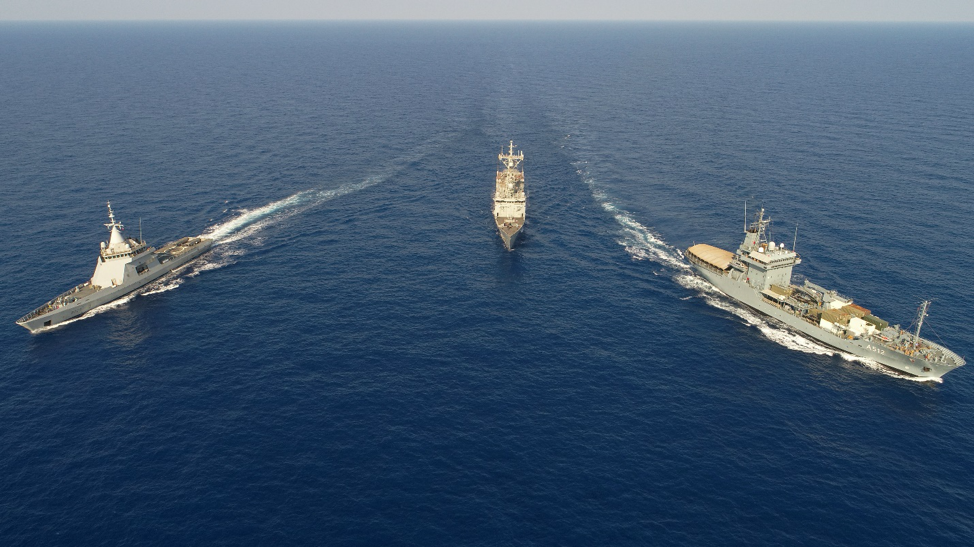
Source: ©2018 Bundeswehr/Christian Fuchs
Towards an era of diminishing returns on military power?
So, in all of the EU’s challenges and opportunities, is it true that ‘military power loses more and more of its utility’, as Heumann noted with regard to the unfolding 21st century?[13] Clearly, this is an observation that provokes a response and requires a nuanced consideration. At first glance, it seems logical that this is the case: the more the world returns to a state in which nuclear-armed great- or superpowers are confronting each other directly in a contest of competing interests, the less military power will be of practical utility in potential confrontations involving any of the ‘big players’ – for its use entails the ultimately suicidal risk of mutually assured destruction (MAD). However, military power will not only continue to be relevant to manage rogue states and violent crises of the ‘new war’ or ‘low intensity’ kind,[14] it is further likely to be of significant deterrent value. While, as defence spending of the Cold War decades has amply demonstrated, even the latter aspect is liable to require considerable cost and effort on the part of the societies that maintain it.
Even in a great-power context, the further removed from a state of near-equilibrium or solidification the international system is, and the more liable to applications or demonstrations of force the contested and contestable so-called ‘commons’ – areas of shared, unclear or unresolved sovereignty – are, the more utility military power will continue to possess.
Indeed, as the more recently developed ‘commons’ come to mind, outer space, cyberspace and ‘big data’, they seem to be only indirectly susceptible to a military tool-set. However, the classic ‘commons’, the one that led to the introduction of the concept into modern thinking on international relations in the first place, is quite clearly susceptible to the application of force: the world ocean.
While the EU seems to be lagging behind in this respect of providing for competitive seapower, especially states in Asia have well recognised its continuing significance and influence on the course of history.[15] After all, substantial naval build-up across the region in South-East Asia is a clear case in point. This is especially seen on the part of China with its expanding militarisation of otherwise civilian maritime endeavours, such as fishing. This is also coupled with the ‘territorialisation’ of international ocean space (the national claiming of parts of the ‘commons’ against existing international law) through the construction of artificial islands. And in all this, the free passage of goods across the world ocean, which all states in the globalised economy vitally depend on, is not guaranteed to continue unhindered of malicious interference by state or non-state actors at all times.
Therefore in terms of land-based and nuclear deterrent, the utility of military force for the EU can be gauged more or less straightforwardly along the lines of the capabilities of the likely opponent: it ultimately is a function of ‘how much is enough to deter Russia from attempting any mutually destructive military adventures on European borders?’ However, when it comes to global challenges, managing violent crises, and especially the militarised threat to international order at sea, the EU’s ‘level of ambition’ with regard to military power, seapower, its naval tool-set and the capability to project force across the ocean, is not so clearly delimitated. Indeed, it will by all accounts – especially when compared with the relative sizes and nature of the competitor faced in each arena – be the much greater challenge in the long run.
How much is enough to deter Russia from attempting any mutually destructive military adventures on European borders?
Europe’s Turn to Act: Advancing its position in key areas of strategic competition
There is no doubt about it, the EU is called upon to act strategically. Indeed, as Heumann points out, its citizens, first and foremost, have made it clear in opinion polls time and again: the main foreign policy challenges the nation-states in Europe face in the 21st century are best addressed through the EU.[16] In this, it has already built up valuable skills, tools and resources to draw upon. For one, the EU has become increasingly effective at one of foreign policy’s ‘most important innovations’ (Heumann):[17] state-building – domestically, as well as internationally. Because of this – and in direct proportion to its cohesive action and commitment to its values, it derives international credibility.[18] After all, in a world of diversity, who could better lay claim to respecting this very multitude, than a global player, which by default rests and even thrives on diversity internally?
Furthermore, economically, the EU is a powerhouse with a strong currency, the Euro, the second-ranking one internationally for loans and national reserves.[19] Despite being the largest global source of foreign aid and direct investment, the EU has yet to recognise and use the economic tool-set strategically. It is, in Heumann’s assessment, high time to rise to the challenge posed by the Chinese ‘Silk Road Initiative’.[20] Therefore, while the Europeans may be uniquely strong in unifying ‘hard-’ and ‘soft-power’ means,[21] in what Joseph Nye famously called a ‘smart power’ approach to foreign policy,[22] they appear to lag behind in translating their potential into a competitive edge and fostering the tools they need for this. Indeed, the current EU’s strategy- and decision-making process does not appear to live up to the degree of agency Heumann calls for – a strategic foreign policy, related capabilities and agency that are high time to develop, as just a brief overview of the rising challenges of the 21st century makes clear beyond a shadow of a doubt.
Below is just such a casual overview of the EU position in contested areas and for key technology:
Concerning the oceans, the EU is clearly a key global economic player, with further substantial institutional and regulatory power.
Two of its member-states still control some of the largest merchant fleets in the world (Greece ranking 2nd and Germany 5th globally in 2020), while Denmark hosts the world’s largest shipping company (Maersk) and several of the most important classification societies and insurance companies have their seats in the EU. A scarce hand-full of its ports still rank among the global top-50 in terms of turn-over and at least its specialist shipbuilding sector – including naval shipbuilding – remains internationally competitive. However, over 93% of global shipbuilding happens in Asia, while over half of the world merchant fleet is owned by Asian companies.[23] Furthermore, EU navies have been substantially cut back in the years of the post-Cold War ‘peace dividend’. Meanwhile, China, in particular, continues to invest heavily in a naval build-up. Specific resources of naval capabilities are often scarce in the EU, spread out among different member-states and many ship-types – a fact that increases cost of construction and maintenance while complicating the procurement of spare parts.[24] Still, the EU has proven that it can act jointly and in a self-directed, efficient and effective comprehensive approach to maritime challenges. For example, the success of the civil-military counter-piracy and stabilisation approach towards piracy at the Horn of Africa in the years following 2008 has demonstrated its unique smart-power skill.[25] Nevertheless, in addition to having continuously lost market-shares in global shipping to Asia over the past decade since 2008,[26] the ‘hard-power’ element to smart EU seapower is being dangerously neglected.
Digitalisation, Big Data, AI, Cyber-Space, IoT and Industry 4.0: Here, the EU may have the advantage of a well-educated work-force, competitive industrial base, research infrastructure and a strong soft-power appeal – people are probably more likely to work for and share information with a ‘player’ that they believe authentically represents and shares their values.[27] It also, with its single unified common market, wields potentially powerful regulatory clout.[28] Indeed, its data and privacy protection regulations seem to have served as leading international standards for others to look up to.[29] Furthermore, the European Commission has clearly identified the issue as one of its key areas of strategic concern, aiming to ‘become a global leader in innovation in the data economy and its applications’.[30]
However, concerning several key factors of the next digital revolution, Europe needs to catch up to the competition and pull together loose, nationally organised strings, such as in Cyber-Security. First of all, most main tech and ‘Big Data’ firms are American and, increasingly, – Chinese. A much called-for ‘European Software-Airbus’ is not getting off the ground, and European data protection and anti-trust regulation has yet to be successfully translated into strategic technological leadership. After all, even the high-profile European Cloud-project, ‘Gaia-X’ eventually had to turn to integrating US companies.[31] Moreover, in the availability of computing power, the key especially to AI, cryptography and cyber-security, the EU has identified the challenge, but lags behind the US and China.[32]
Furthermore, while, as Heumann points out, 5G technology theoretically poses an opportunity for Europeans to outpace its competitors in the US and China,[33] a recent scenario based on current bureaucratic delays (only 27,5% of designated 5G licenses were as yet allocated for EU and UK jointly by September 2020),[34] highlights the risk that Europe may ‘miss the boat’ on next-level hyper-connectivity, including dependent automatization and decentralised digitalisation.[35] Still, Heumann sees the main advantage of the EU not in emulating the US or Chinese approach to AI and digitalisation, but in playing to European strengths. For example, the manufacturing industry (especially in Germany) that could increasingly form the backbone for winning the race in AI-driven automatization, robotics, cloud-based networked production in the so-called ‘Industry 4.0’.[36]
For global competition for leadership in outer space, the EU at least has a solid domestic foundation. As space-programmes are both very expensive and have also not been high on the political agenda of national member-states after the Cold War, the European Space Agency (ESA) has greater comparative significance, than for example its defence-focussed ‘sister’ the European Defence Agency (EDA). After all, while member-states still commission their defence-projects nationally (albeit with laudable joint procurement initiatives like the OCCAR-agency), the development of new space assets is a European endeavour. Airbus (and its subsidiaries), a pan-European enterprise, is the main industrial base behind this. In all likelihood, the strategic relevance of the space domain is bound to increase. At this point, from nuclear deterrence (similar technology in delivery rockets for satellites and ballistic missiles), to navigation, targeting, surveillance, command and control, as well as communications, key strategic military factors are already heavily dependent on space-based assets. Furthermore, society and the economy benefit from the direct effects of the so-called ’space-economy’, as well as indirect technological innovation driven by space exploration. However, Heumann has little to say on the EU competitive position in the ongoing great-power competition for outer-space-preponderance. Here as well, the US have substantially more experience and spend vastly more on their space programme (statistics from 2018 give an almost tenfold space-budget as compared to the combined German and French one)[37] – both publicly and in the private sector. Therefore, while China is also increasingly building up its capabilities – including military ones, the EU clearly has to brace itself for another challenging contest.
Finally, the last area of strategic competition considered here, renewable energy and a sustainable resource-base, is subject to considerable domestic political pressure in the EU. This is driven by geopolitical factors and a growing sense of urgency in the light of climate change and its consequences. With ‘green’ parties across Europe, the influential ‘Fridays for Future’ movement and the recognition of the risks inherent in pollution and climate change well established in mainstream politics, the EU and its member-states are held accountable by their citizens as to their policies with regard to a ‘green economy’. In addition to this, conflict, prosperity and migration in and from the Middle East and the African continent are already affected by climate change. Migration from these regions to Europe is identified as one of the main contemporary challenges (including opportunities) to Europe – to master positively or fail – also with regard to its own humanitarian values and to maintaining its domestic political cohesion. Therefore, in addition to achieving greater strategic autonomy from imports of fossil fuels and raw material, a ‘green(er)’ economy would also serve to benefit the EU’s general geostrategic context with regard to instability in its southern and south-eastern neighbourhood.
Furthermore, economic prosperity already depends on the sustainability of products and services. Potential customers, skilled labour, investors and supply-chain partners have long started to screen for ‘green’ factors in their choices. The EU and several of its member-states have made early efforts at transition and can draw on various strengths (i.e. Germany and the Scandinavian countries in wind-energy – especially offshore; France in nuclear energy – including research aimed at developing safe and clean nuclear fission).
However, the US, and especially China, have made astounding progress in the development and application of technology in the last years. To the point that China may even indeed be in a position for the ‘renewable energy superpower’,[38] dominating the global market on and application of solar energy. China far outstrips the EU and is projected to have twice the amount of solar panels in place than the US by 2024, while at the same holding almost a third of global cumulative patents in renewable energy technology (29% China, 18% USA, 14% EU).[39] Heumann, in turn, optimistically sees potential for the EU to catch up and even assume leadership in global ‘green technology’ and limiting the effects of climate change with international initiatives.[40] Clearly, the EU has no alternative but to tackle the challenges head-on, but it does not seem to do so from a competitive position of relative strength.
Beyond a ‘Zero-Sum Game’: The Need to Cooperate
Managing challenges, competition and cooperation, improving its own position in either case, is exactly the ‘strategic foreign policy’ that Heumann calls for in his 2020 book. A book that is the product of a life-time of experience in the field of diplomacy. Therefore, it deserves to be read beyond academia’s confines, and has to find its way into the hands of practitioners of foreign policy and political leadership. Indeed, considering the saliency of the issues addressed, all concerning the EU’s capability to assume agency and contribute to shaping the international order, it is a timely and relevant book. One that, while embracing technological advances, is resplendent with historical excursions and detail. Furthermore, it draws part of its value especially from this latter aspect: advocating for comprehensive incorporation of historical undercurrents – ‘long lines’ – into foreign policy strategy-making. After all, conscious of more than 150 years of history, Heumann sees European integration as powerfully driven by a vital German interest to prevent renewed isolation in the centre of the continent. He further proposes EU-Russian-relations as a historical continuation of Bismarck’s German tradition of ‘balancing’ the ‘immovable’ neighbour to the East against threats of emerging hostile coalitions to the West – or today: powerful potential rivals in the global arena. Indeed, with regard to key areas of competition, looking at the relative position of Europe as compared to its main global economic (US and China) and political (China) challengers, Russia remains a potential rival as much as a valuable partner. And this concerns especially a rising China, increasingly autocratic at home, and muscular in its foreign policy.
Ultimately, wherever 21st century challenges arise, and whichever contested area of as-yet undecided preponderance – renewable energy, cyber-space, outer space, ‘big data’, automatisation, AI, computing capacity, or the ocean: the EU has several advantages upon which it can build.
However, it clearly needs to capitalise on them and bring them to bear to succeed against formidable competition that has already drawn ahead in most fields. Nevertheless, international relations and handling the challenges of the future is not a ‘zero-sum’-game. There is not only competition, but also mutually beneficial cooperation possible. Still, possibilities need to be created and not merely hoped for. These depend on what the EU has to offer in exchanges of goods, services, technology, skills and ideas – and it seems to increasingly do so from a weakening position. Simply put, in terms of soft and hard power, attraction, shared values, or coercion and deterrence, the EU needs to join and optimise its still considerable resources to not become a mere object of international politics instead of an agent of change for the better.
Moritz Brake, Kapitänleutnant of the German Navy, is also a visiting lecturer at the University of Bonn on maritime security and strategy, as well as a PhD candidate at the Department of War Studies at King’s College London. He recently co-authored a paper on ‘Building European Seapower’ in the journal of the Royal Swedish Society of Naval Sciences, while he generally focusses on the maritime and naval dimension of German and European foreign policy in his research. The views contained in this article are the author’s alone and do not represent the views of the German Navy.
[1] Hans-Dieter Heumann, Strategische Diplomatie: Europas Chance in der multipolaren Welt (Paderborn: Verlag Ferdinand Schöningh, 2020), 209.
[2] ibid., 183.
[3] Daniel Treismann, “Why Putin Took Crimea – The Gambler in the Kremlin,“ Foreign Affairs (May/June 2016), 53-54.
[4] Dmitry Adamsky, “Putin’s Game in Syria – Why a Withdrawal Does Not Mean a Pullout,“ Foreign Affairs, https://www.foreignaffairs.com/articles/syria/2016-04-03/putins-game-syria, as last accessed: 02/28/2021.
[5] BBC News, “Migration to Europe in charts,” last updated, 2018, BBC, https://www.bbc.com/news/world-europe-44660699#:~:text=The%20top%20countries%20by%20origin%20of%20asylum%20seekers,919,000%20Syrians%20applied%20for%20asylum%20in%20the%20EU., last accessed: 02/28/2021.
[6] John Gaddis, On Grand Strategy (New York:Penguin Press, 2018), 21.
[7] As expressed during the presentation of his book at ‘La Redoute’-International Club in Bonn, 14.09.2020
[8] Heumann, Strategische Diplomatie, 19.
[9] United Nations (UN), “Sustainable Development Goals,” last updated, 2015, United Nations, https://sdgs.un.org/goals, last accessed: 03/01/2021.
[10] Heumann, Strategische Diplomatie, 194.
[11] Marianne Riddervold, The Maritime Turn in EU Foreign and Security Policy (Palgrave Macmillan, 2019), 207, 212.
[12] Heumann, Strategische Diplomatie, 193.
[13] ibid.
[14] see i.e. Kaldor’s ‘classic’ description of such conflicts which blur the lines between war and organised crime, while often including large-scale violence against civilians, Mary Kaldor, New and Old Wars (Cambridge: Polity Press, 2012), introduction.
[15] Geoffrey Till, Seapower – A Guide for the 21st Century (London: Routledge, 2013), foreword.
[16] Heumann, Strategische Diplomatie, 174.
[17] ibid., 31.
[18] ibid., 174-177.
[19] ibid., 173.
[20] ibid., 206.
[21] ibid., 193.
[22] Joseph Nye, Soft Power (Public Affairs, Cambridge, 2004), 32.
[23] United Nations, “United Nations Conference on Trade and Development (UNCTAD),” 2020 e-handbook of statistics – Merchant Fleet, last updated, 2020, https://stats.unctad.org/handbook/MaritimeTransport/MerchantFleet.html, last accessed: 03/01/2021
[24] Jeremy Stöhs, The Evolution of European Naval Power 1989-2019: Strategy – Force Structure – Operations (Annapolis: Naval Institute Press: 2019).
[25] Thierry Tardy, Fighting piracy off the coast of Somalia: Lessons learned from the Contact Group (Paris: EU Institute for Security Studies, 2014)
[26] see i.e. KRÜGER-KOPISKE. (2017), Schifffahrt im 21. Jahrhundert (Koehler, 55 and 115).
[27] Nye, Softpower, 31.
[28] Heumann, Strategische Diplomatie, 216.
[29] Francis Fukuyama, Barak Richmann and Ashish GOEL, “How to Save Democracy From Technology,“ Foreign Affairs (2021), 104.
[30] White Paper “On Artificial Intelligence – A European approach to excellence and trust” (2020), 2.
[31] Monika Ermert, “Missing Link: Souverän im Netz – wie Staaten digitale Selbstbestimmung gestalten,” Heise online (January 03, 2021), https://www.heise.de/hintergrund/Missing-Link-Souveraen-im-Netz-wie-Staaten-digitale-Selbstbestimmung-gestalten-5001818.html?seite=all, last accessed: 03/01/2021.
[32] Heise Online, “Digitale EU-Dekade: Superrechner und schnelle Netze für digitale Souveränität,” Heise Online, https://www.heise.de/news/Digitale-EU-Dekade-Superrechner-und-schnelle-Netze-fuer-digitale-Souveraenitaet-4906029.html, last accessed: 03/01/2021
[33] Heumann, Strategische Diplomatie, 219.
[34] Heise Online.
[35] Gustav Lindstrom, “WHAT IF… EUROPEAN DELAYS IN 5G SHORTCHANGE THE PATH TOWARDS 6G?,” inWhat if…? The cost of inaction, ed. Florence Gaub (Paris: European Union Institute for Security Studies, 2021).
[36] Elena Mazareanu, “Government expenditure on space programs from 2014 to 2018,” by country (in billion U.S. dollars), last updated, 2019, Statista, https://www.statista.com/statistics/745717/global-governmental-spending-on-space-programs-leading-countries/, as last accessed: 03/09/2021.
[37] Heumann, Strategische Diplomatie, 220.
[38] International Renewable Energy Agency (IRENA), “A New World – The Geopolitics of the Energy Transformation,“ International Renewable Energy Agency (IRENA), 40.
[39] Edmont, “China’s lead in the global solar race – at a glance, last updated,” 2019, World Economic Forum, https://www.weforum.org/agenda/2019/06/chinas-lead-in-the-global-solar-race-at-a-glance/, last accessed: 03/01/2021.
[40] Heumann, Strategische Diplomatie, 214.


